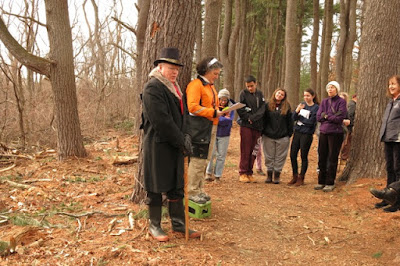 |
| Poetry Walk at the Lone Tree Hill Reservation In Belmont |
From Ann-Marie Lambert/Belmont Citizen's Forum
Hello friends, colleagues, neighbors, and participants on previous Nature Walks:
I invite you to join a guided nature walk through the Lone Tree Hill Reservation in Belmont Sunday, May 22, 1:30-3:30. I am delighted to be joined by special guest poet Douglas Holder, who has served since 1982 as a Counselor and Poetry Workshop Leader at the adjacent McLean Hospital. Mr. Holder also plays many roles in the local poetry scene, including: Host of “Poet to Poet, Writer to Writer” on Somerville Community Access TV; various roles at Endicott College in Beverly, Mass., including Adjunct Professor of Creative Writing, Director of the Ibbetson Street Press and Associate Faculty Editor of the undergraduate literary review; Adjunct Professor of College Writing at Bunker Hill Community College; Senior editor at ISCS Press in Littleton, Mass.; Book Review Editor, Wilderness House Literary Review; Poetry Workshop Leader at Jewish Community Centers of Greater Boston; Curator of the Newton Free Library Poetry Reading Series; Arts Editor of The Somerville Times; and Advisory Board Member--Tapestry of Voices/ Boston National Poetry Festival.
Mr. Holder will help us enjoy poems which reflect on the drama and awakening taking place in this season, both within McLean and without, in Nature. We will explore the forests, meadows, and trails in the gem of a landscape which surrounds the "Lone Tree Hill" and McLean. We will stop along the way to read short poems from a variety of cultures, each with their own perspective on human and wildlife activities of Spring. We will meet at Belmont's Highland Meadow cemetery, stroll along the famous Pine Allee, take in stunning views of the meadow and surrounding forest from Lone Tree Hill, explore the forest habitat surrounding the old Coal Road, and discover the mix of clues that nature and civilization have left for us to learn about the history of this land. People have been strolling here for centuries, healing and gaining inspiration from this beautiful home to wildlife such as red fox, coyote, cottontail rabbit, voles, chipmunks, bees, dragonflies, and many residential birds such as wild turkey, red-tailed hawks, hummingbirds, woodpeckers, chickadees, tufted titmouse, and goldfinches.
Come reconnect with the land through poetry from New England and around the globe. Poets are keen observers of nature and human nature, of the drama and rebirth of Spring, and of the importance of land and place. Find inspiration from those whose poems express love and concern for the natural landscape, and for oftentimes more mysterious internal landscapes. Let the poets help you appreciate this nearby gem, with its rich history as a part of the grounds of the McLean hospital of Belmont.
What: Listen to poetry as we stop along a one-mile nature trail in Belmont with a special guest from McLean
When: 1:30-3:30 p.m. Sunday, May 22, 2016
Where: Highland Meadow Cemetery, 700 Concord Avenue, Belmont. If you are already familiar with the area, town officials strongly urge you park early at the parking lots by Rock Meadow on Mill Street and hike 10-15 minutes to the cemetery location. If not, park cars along one side of the cemetery driveway loop across from Somerset St. (stay on the pavement).
Who: Anne-Marie Lambert is a Belmont Citizens Forum board member who has been leading local nature walks and writing Newsletter articles about Belmont history and storm water. This is her fourth guided nature walk to explore the four seasons at Lone Tree Hill.
Bring/Wear: water to drink, closed shoes, weather-appropriate clothing, and, optionally, a walking stick for uneven terrain.
Rain: Only thunderstorms will cancel.
Trail Map: Lone Tree Hill Map






































